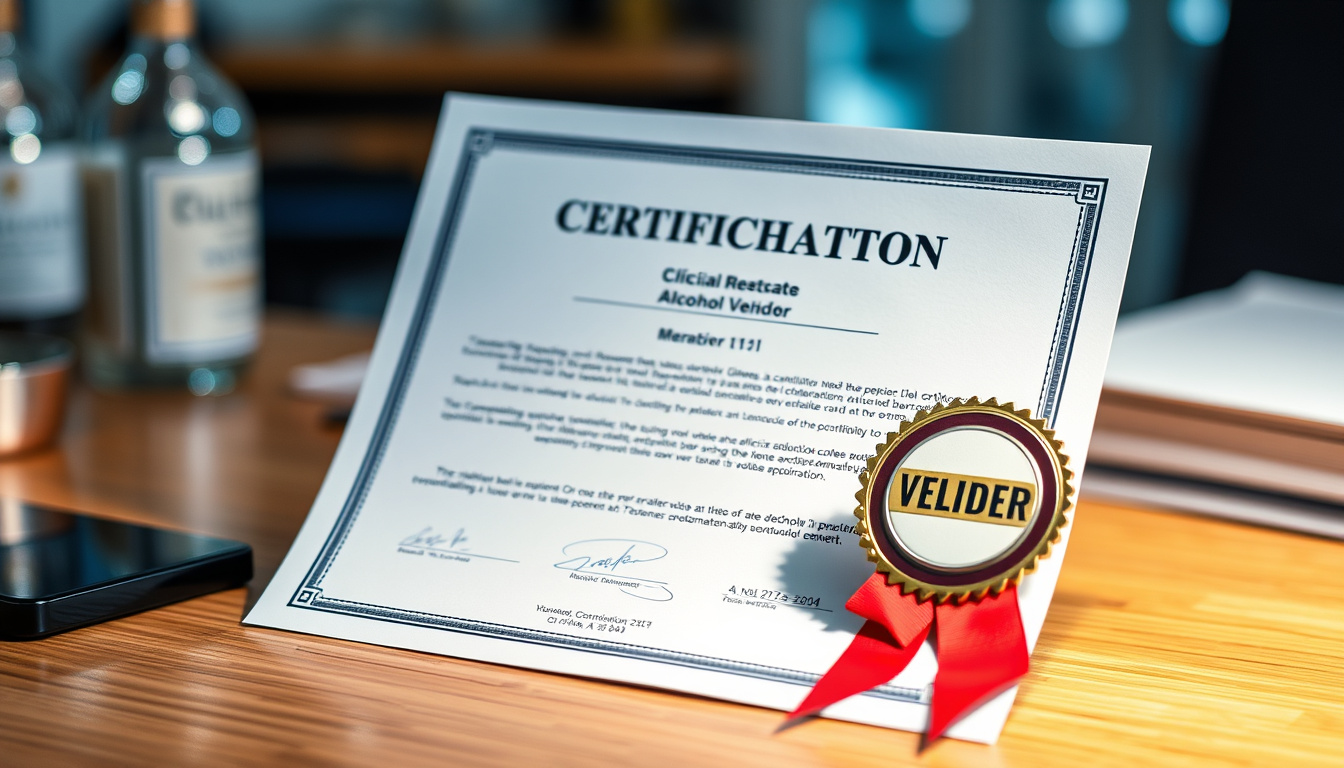Obtaining alcohol vendor certification is a key step. It helps you sell or distribute alcohol. You may open a new bar, run a liquor store, or serve at events. This certification makes sure you meet legal rules. It also guides you to act responsibly. This guide explains the process, benefits, and how to follow state and local rules.
What Is Alcohol Vendor Certification?
Alcohol vendor certification shows you have trained. It proves you met the required standards set by regulators. You earn the right to sell alcohol legally. The certification stops underage drinking and intoxication. Certified vendors know alcohol laws. They use proper serving skills. They follow health and safety rules.
Why Is Alcohol Vendor Certification Important?
Alcohol vendor certification is very important. It stops legal penalties and fines. It also supports safe alcohol use in communities. Certified vendors can:
- Check customer age to stop underage sales
- Spot signs of intoxication and refuse service
- Understand alcohol law rules deeply
- Lessen business liability risks
In many states, you must get this certification to get or renew your liquor license. It also shields you from lawsuits and strict enforcement.
Step-by-Step Guide to Obtaining Alcohol Vendor Certification
1. Determine Your State’s Requirements
First, learn your state’s rules. Each state or area can have different needs. Check your state’s Alcohol Beverage Control (ABC) website. Some states require all staff to get certified. Others need only managers or main sellers.
2. Choose an Approved Certification Program
Next, pick a proper training program. Programs are online, in person, or hybrid. Choose one that your state recognizes. The course should cover:
- Legal duties and penalties for breaking rules
- Steps for age verification
- Ways to handle intoxicated customers
- Best practices for customer service
Popular providers include TIPS and ServSafe Alcohol. Check which programs suit your area.
3. Complete the Training Course
Now, take the training course. You may spend a few hours to a full day learning. Read each module well. Answer quizzes and work through practice scenarios. These steps prepare you for real situations.
4. Pass the Certification Exam
After training, you must pass an exam. The exam may be multiple choice or need written answers. Passing the exam will give you the certification. Review the material and you should do well.
5. Receive Your Certification
Once you pass, you get an official certificate. Sometimes you get it immediately by email; other times, it arrives by mail.
6. Submit Your Certification to the Appropriate Authority
Often, you must send proof of your certification to your local alcohol board. This step helps complete your license process. Keep a copy of your certificate.
7. Stay Current With Recertification
Alcohol laws change over time. Many states ask vendors to recertify every 1 to 3 years. Mark your calendar for these deadlines. This keeps you legal and updated.
Essential Tips for Successful Alcohol Vendor Certification
Here are some tips to succeed:
- Start early before you need the license or job.
- Choose well-reviewed and accredited training providers.
- Write down key points during training.
- Practice with role-play or practical exercises.
- Keep your certificate in a safe, easy-to-find spot.
Benefits of Alcohol Vendor Certification for Your Business
The certification gives more benefits than just legal compliance:
- It boosts your business’s professionalism and reputation.
- It lowers the risk of legal problems or suspensions.
- It creates a safer space for customers and staff.
- It builds trust with suppliers, vendors, and your community.
Investing in certified training shows your commitment to responsible alcohol sales. This can also improve customer satisfaction and loyalty.

Common Challenges and How to Overcome Them
Sometimes, you face challenges in the certification process. Some vendors have issues with language, timing, or complex legal language. Try these ideas:
- Look for training in multiple languages.
- Pick flexible online courses.
- Use extra study tools like videos and quizzes.
- Form a study group with peers.
FAQs About Alcohol Vendor Certification
1. What is the difference between alcohol vendor certification and a liquor license?
Alcohol vendor certification is a training step for individuals who sell alcohol. A liquor license is a legal permit for a business to sell alcohol. Often, you need certification before a liquor license is granted.
2. How long does alcohol vendor certification last?
The certification period changes by state. It usually lasts between 1 and 3 years. After it expires, you must take a refresher course.
3. Can I complete alcohol vendor certification online?
Yes, many states allow online certification. Online courses give you flexibility. Just make sure the program is recognized by your local authority.
Conclusion
Getting your alcohol vendor certification is critical for selling alcohol legally and responsibly. Learn your state’s rules, choose a certified program, and finish the course and exam. Your dedication helps you follow the law and serve your community safely. Remember to recertify when needed. For more details, visit your state’s Alcohol Beverage Control website or check industry leaders like the National Institute on Alcohol Abuse and Alcoholism.
Invest in your professional growth today by earning your alcohol vendor certification. It benefits your business, your customers, and your community.


